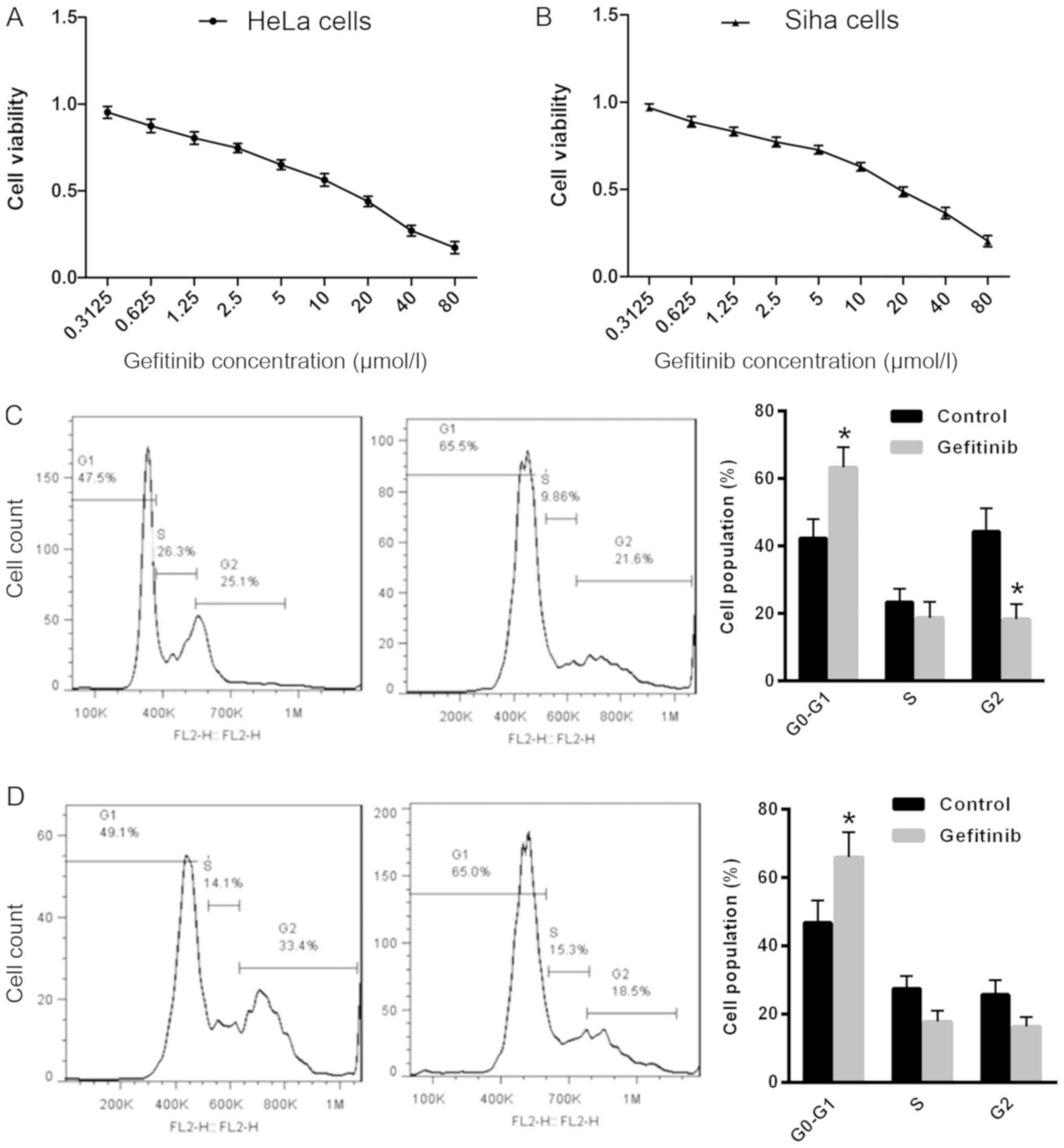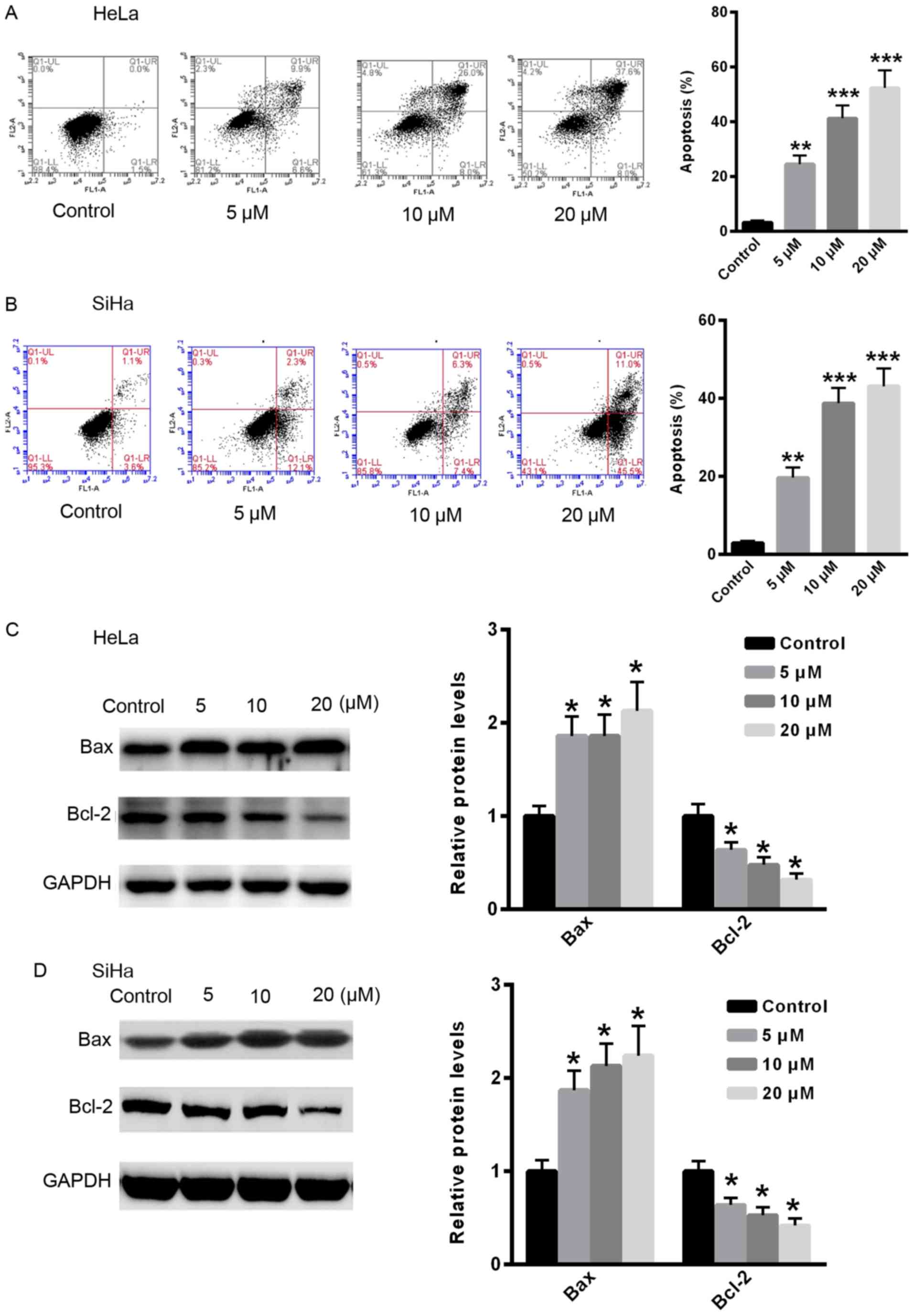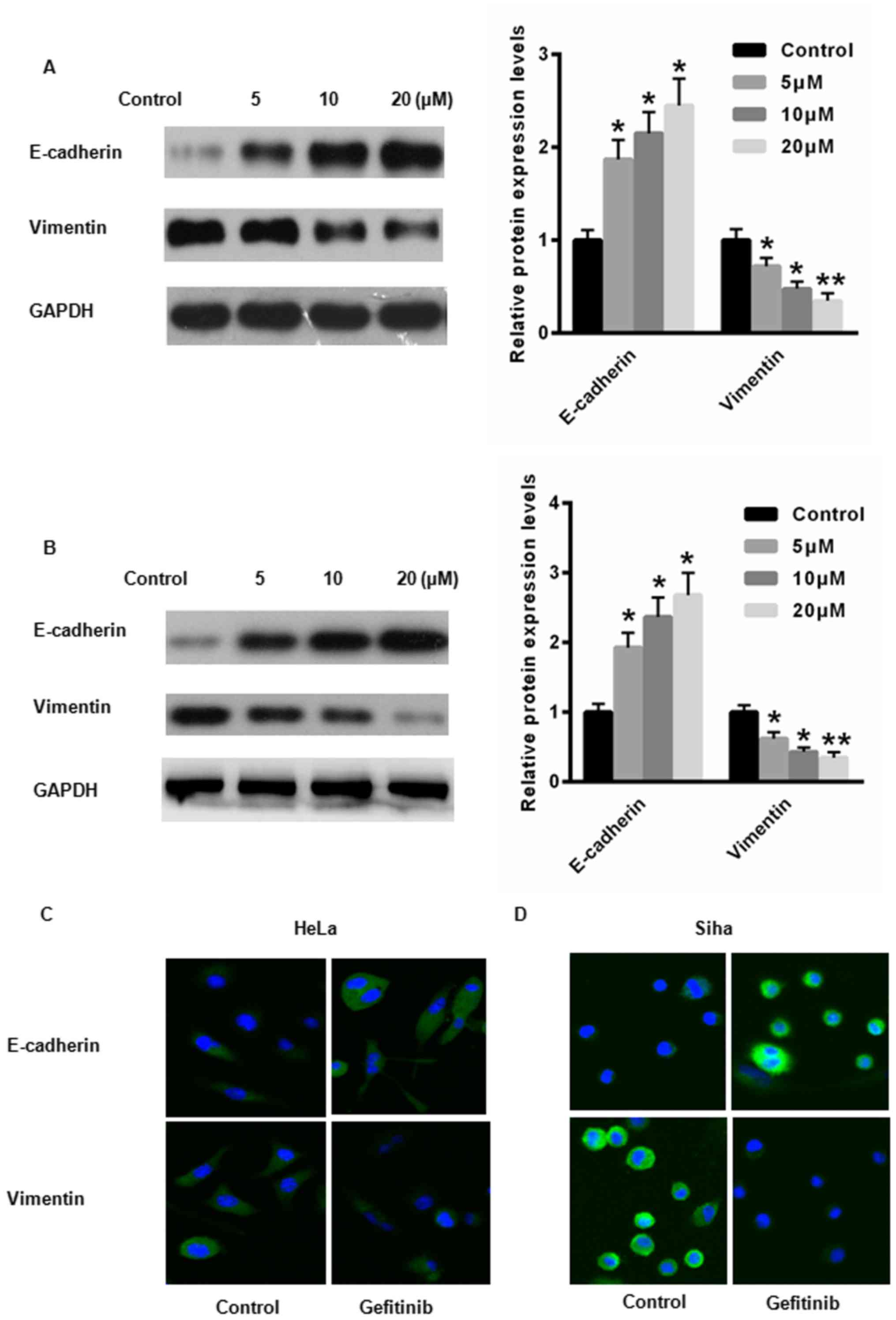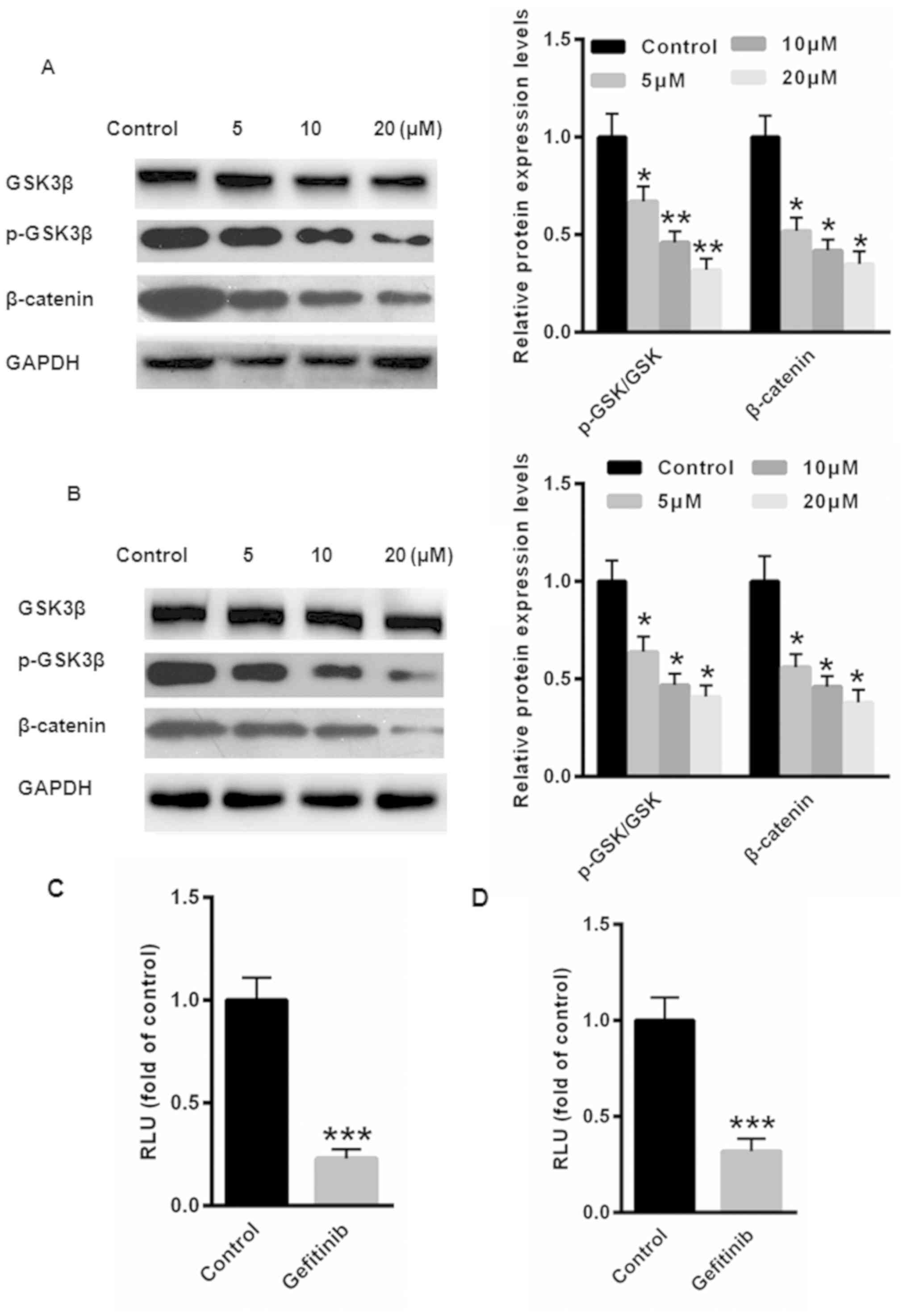|
1
|
Zhang R, Lu H, Lyu YY, Yang XM, Zhu LY,
Yang GD, Jiang PC, Re Y, Song WW, Wang JH, et al:
E6/E7-P53-POU2F1-CTHRC1 axis promotes cervical cancer metastasis
and activates Wnt/PCP pathway. Sci Rep. 7:447442017. View Article : Google Scholar : PubMed/NCBI
|
|
2
|
Bahrami A, Hasanzadeh M, ShahidSales S,
Yousefi Z, Kadkhodayan S, Farazestanian M, Joudi Mashhad M, Gharib
M, Mahdi Hassanian S and Avan A: Clinical significance and
prognosis value of Wnt signaling pathway in cervical cancer. J Cell
Biochem. 118:3028–3033. 2017. View Article : Google Scholar : PubMed/NCBI
|
|
3
|
Chung MT, Lai HC, Sytwu HK, Yan MD, Shih
YL, Chang CC, Yu MH, Liu HS, Chu DW and Lin YW: SFRP1 and SFRP2
suppress the transformation and invasion abilities of cervical
cancer cells through Wnt signal pathway. Gynecol Oncol.
112:646–653. 2009. View Article : Google Scholar : PubMed/NCBI
|
|
4
|
Cui N, Yang WT and Zheng PS: Slug inhibits
the proliferation and tumor formation of human cervical cancer
cells by up- regulating the p21/p27 proteins and down-regulating
the activity of the Wnt/β-catenin signaling pathway via the
trans-suppression Akt1/p-Akt1 expression. Oncotarget.
7:26152–26167. 2016. View Article : Google Scholar : PubMed/NCBI
|
|
5
|
Hua F, Liu S, Zhu L, Ma N, Jiang S and
Yang J: Highly expressed long non-coding RNA NNT-AS1 promotes cell
proliferation and invasion through Wnt/beta-catenin signaling
pathway in cervical cancer. Biomed Pharmacother. 92:1128–1134.
2017. View Article : Google Scholar : PubMed/NCBI
|
|
6
|
Kloth JN, Fleuren GJ, Oosting J, de
Menezes RX, Eilers PH, Kenter GG and Gorter A: Substantial changes
in gene expression of Wnt, MAPK and TNFalpha pathways induced by
TGF-beta1 in cervical cancer cell lines. Carcinogenesis.
26:1493–1502. 2005. View Article : Google Scholar : PubMed/NCBI
|
|
7
|
Kwan HT, Chan DW, Cai PC, Mak CS, Yung MM,
Leung TH, Wong OG, Cheung AN and Ngan HY: AMPK activators suppress
cervical cancer cell growth through inhibition of DVL3 mediated
Wnt/beta-catenin signaling activity. PLoS One. 8:e535972013.
View Article : Google Scholar : PubMed/NCBI
|
|
8
|
Lan K, Zhao Y, Fan Y, Ma B, Yang S, Liu Q,
Linghu H and Wang H: Sulfiredoxin may promote cervical cancer
metastasis via Wnt/β-catenin signaling pathway. Int J Mol Sci.
18:E9172017. View Article : Google Scholar : PubMed/NCBI
|
|
9
|
Lee J, Yoon YS and Chung JH: Epigenetic
silencing of the WNT antagonist DICKKOPF-1 in cervical cancer cell
lines. Gynecol Oncol. 109:270–274. 2008. View Article : Google Scholar : PubMed/NCBI
|
|
10
|
Li F, Wang T and Tang S: SOX14 promotes
proliferation and invasion of cervical cancer cells through
Wnt/β-catenin pathway. Int J Clin Exp Pathol. 8:1698–1704.
2015.PubMed/NCBI
|
|
11
|
Xu CR, Zhong WZ, Zhou Q, Zhang XC, Yang JJ
and Wu YL: Heterogeneity of the resistance to gefitinib treatment
in a non-small cell lung cancer patient with active epidermal
growth factor receptor mutation. Thorac Cancer. 8:51–53. 2017.
View Article : Google Scholar : PubMed/NCBI
|
|
12
|
Yang RF, Yu B, Zhang RQ, Wang XH, Li C,
Wang P, Zhang Y, Han B, Gao XX, Zhang L and Jiang ZM: Bevacizumab
and gefitinib enhanced whole-brain radiation therapy for brain
metastases due to non-small-cell lung cancer. Braz J Med Biol Res.
51:e60732017. View Article : Google Scholar : PubMed/NCBI
|
|
13
|
Yang XB, Chai XS, Wu WY, Long SQ, Deng H,
Pan ZQ, He WF, Zhou YS, Liao GY and Xiao SJ: Gefitinib plus Fuzheng
Kang'ai formula () in patients with advanced non-small cell lung
cancer with epidermal growth factor receptor mutation: A randomized
controlled trial. Chin J Integr Med. 24:734–740. 2018. View Article : Google Scholar : PubMed/NCBI
|
|
14
|
Yang Z, Hackshaw A, Feng Q, Fu X, Zhang Y,
Mao C and Tang J: Comparison of gefitinib, erlotinib and afatinib
in non-small cell lung cancer: A meta-analysis. Int J Cancer.
140:2805–2819. 2017. View Article : Google Scholar : PubMed/NCBI
|
|
15
|
Xu S and Gotlieb AI: Wnt3a/β-catenin
increases proliferation in heart valve interstitial cells.
Cardiovasc Pathol. 22:156–166. 2013. View Article : Google Scholar : PubMed/NCBI
|
|
16
|
Qureshi R, Arora H and Rizvi MA: EMT in
cervical cancer: Its role in tumour progression and response to
therapy. Cancer Lett. 356:321–331. 2015. View Article : Google Scholar : PubMed/NCBI
|
|
17
|
Xu S, Fan Y, Li D, Liu Y and Chen X:
Glycoprotein nonmetastatic melanoma protein B accelerates
tumorigenesis of cervical cancer in vitro by regulating the
Wnt/β-catenin pathway. Braz J Med Biol Res. 52:e75672018.
View Article : Google Scholar : PubMed/NCBI
|
|
18
|
Li S, Yang F, Wang M, Cao W and Yang Z:
miR-378 functions as an onco-miRNA by targeting the
ST7L/Wnt/β-catenin pathway in cervical cancer. Int J Mol Med.
40:1047–1056. 2017. View Article : Google Scholar : PubMed/NCBI
|
|
19
|
Liu P, Ma S, Liu H, Han H and Wang S: HCFU
inhibits cervical cancer cells growth and metastasis by
inactivating Wnt/β-catenin pathway. J Cell Biochem. Dec
12–2017.(Epub ahead of print) doi: 10.1002/jcb.26570.
|
|
20
|
Liu XF, Li XY, Zheng PS and Yang WT: DAX1
promotes cervical cancer cell growth and tumorigenicity through
activation of Wnt/β-catenin pathway via GSK3beta. Cell Death Dis.
9:3392018. View Article : Google Scholar : PubMed/NCBI
|
|
21
|
Hartmann S, Neckel N, Seher A, Mutzbauer
G, Brands RC, Linz C, Kübler AC and Müller-Richter UD: Erlotinib
and gefitinib responsiveness in head and neck cancer cell lines-a
comparing analysis with cetuximab. Clin Oral Investig. 20:759–769.
2016. View Article : Google Scholar : PubMed/NCBI
|
|
22
|
Li Q, Zhang D, Chen X, He L, Li T, Xu X
and Li M: Nuclear PKM2 contributes to gefitinib resistance via
upregulation of STAT3 activation in colorectal cancer. Sci Rep.
5:160822015. View Article : Google Scholar : PubMed/NCBI
|
|
23
|
Geng D, Sun D, Zhang L and Zhang W: The
therapy of gefitinib towards breast cancer partially through
reversing breast cancer biomarker arginine. Afr Health Sci.
15:594–597. 2015. View Article : Google Scholar : PubMed/NCBI
|
|
24
|
Jiang C, Xu R, Li XX, Wang YY, Liang WQ,
Zeng JD, Zhang SS, Xu XY, Yang Y, Zhang MY, et al: p53R2
overexpression in cervical cancer promotes AKT signaling and EMT,
and is correlated with tumor progression, metastasis and poor
prognosis. Cell Cycle. 16:1673–1682. 2017. View Article : Google Scholar : PubMed/NCBI
|
|
25
|
Fernando G, Paul F, Laura J, Alejandra AM,
Gabriela M and Alberto PL: Is the Wnt/β catenin signalling pathway
activated in Seminoma? An immunohistochemical study. J Cancer Res
Ther. 12:1075–1079. 2016. View Article : Google Scholar : PubMed/NCBI
|
|
26
|
Yang C, Du W and Yang D: Inhibition of
green tea polyphenol EGCG((−)-epigallocatechin-3-gallate) on the
proliferation of gastric cancer cells by suppressing canonical
wnt/β-catenin signalling pathway. Int J Food Sci Nutr. 67:818–827.
2016. View Article : Google Scholar : PubMed/NCBI
|
|
27
|
Mittag S, Valenta T, Weiske J, Bloch L,
Klingel S, Gradl D, Wetzel F, Chen Y, Petersen I, Basler K and
Huber O: A novel role for the tumour suppressor Nitrilase1
modulating the Wnt/β-catenin signalling pathway. Cell Discov.
2:150392016. View Article : Google Scholar : PubMed/NCBI
|
|
28
|
van Zuylen WJ, Rawlinson WD and Ford CE:
The Wnt pathway: A key network in cell signalling dysregulated by
viruses. Rev Med Virol. 26:340–355. 2016. View Article : Google Scholar : PubMed/NCBI
|


















